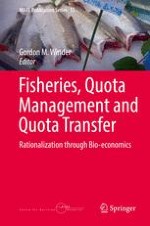2018 | OriginalPaper | Buchkapitel
2. Fisheries Biology and the Dismal Science: Economists and the Rational Exploitation of Fisheries for Social Progress
verfasst von : Jennifer Hubbard
Erschienen in: Fisheries, Quota Management and Quota Transfer
Aktivieren Sie unsere intelligente Suche, um passende Fachinhalte oder Patente zu finden.
Wählen Sie Textabschnitte aus um mit Künstlicher Intelligenz passenden Patente zu finden. powered by
Markieren Sie Textabschnitte, um KI-gestützt weitere passende Inhalte zu finden. powered by
